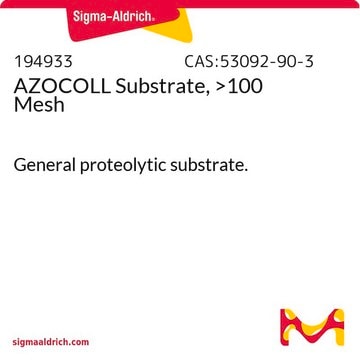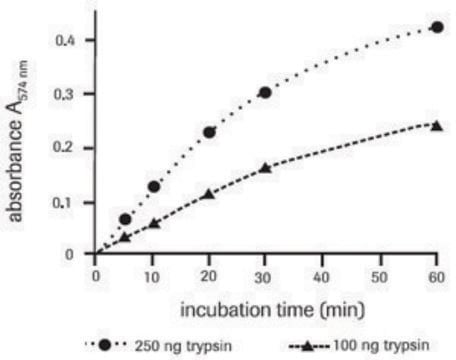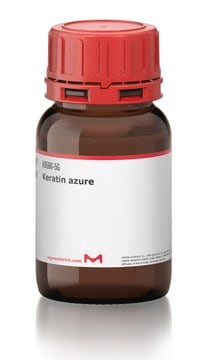194932
AZOCOLL Substrate, <50 Mesh
General proteolytic substrate.
Synonym(s):
AZOCOLL Substrate, <50 Mesh
Sign Into View Organizational & Contract Pricing
All Photos(1)
About This Item
Recommended Products
Quality Level
form
solid
manufacturer/tradename
Calbiochem®
storage condition
OK to freeze
protect from light
color
dark red
solubility
aqueous buffer: soluble
water: soluble
shipped in
ambient
storage temp.
10-30°C
General description
General proteolytic substrate. Provides a rapid and simple spectrophotometric method to detect the presence of proteases in aqueous solutions. As the insoluble substrate is cleaved by proteases, it releases a red dye into the surrounding buffer. Incubation of 50 mg AZOCOLL Substrate with 2 units of PRONASE Protease for 15 min yields an absorbance of greater than 1.0 at 520 nm.
This product has been discontinued.
General proteolytic substrate. Provides a rapid, simple method for the detection of proteases in aqueous solutions. Color yield (520 nm): >1.0; blank (520 nm, 50 mg/5 ml buffer, 10 minutes at 37°C, pH 7.0): <0.2. Mesh: <50 (minimum 80%).
General proteolytic substrate. Provides a rapid, simple method for the detection of proteases in aqueous solutions. Color yield (520 nm): >1.0; blank (520 nm, 50 mg/5 ml buffer, 10 minutes at 37°C, pH 7.0): <0.2. Mesh: <50 (minimum 80%).
Warning
Toxicity: Standard Handling (A)
Other Notes
Poilane, I., et al. 1998. Can. J. Microbiol. 44, 157.
Braganza, V.J., and Simmons, W.H. 1991. Biochemistry 30, 4997.
Moore, G.L. 1969. Anal. Biochem. 32, 122.
Braganza, V.J., and Simmons, W.H. 1991. Biochemistry 30, 4997.
Moore, G.L. 1969. Anal. Biochem. 32, 122.
Legal Information
CALBIOCHEM is a registered trademark of Merck KGaA, Darmstadt, Germany
Storage Class Code
11 - Combustible Solids
WGK
WGK 3
Flash Point(F)
Not applicable
Flash Point(C)
Not applicable
Certificates of Analysis (COA)
Search for Certificates of Analysis (COA) by entering the products Lot/Batch Number. Lot and Batch Numbers can be found on a product’s label following the words ‘Lot’ or ‘Batch’.
Already Own This Product?
Find documentation for the products that you have recently purchased in the Document Library.
Our team of scientists has experience in all areas of research including Life Science, Material Science, Chemical Synthesis, Chromatography, Analytical and many others.
Contact Technical Service



![N-[3-(2-Furyl)acryloyl]-Leu-Gly-Pro-Ala](/deepweb/assets/sigmaaldrich/product/structures/805/876/96b5fb57-71c8-4c6b-b5d2-fafe7374cd85/640/96b5fb57-71c8-4c6b-b5d2-fafe7374cd85.png)




